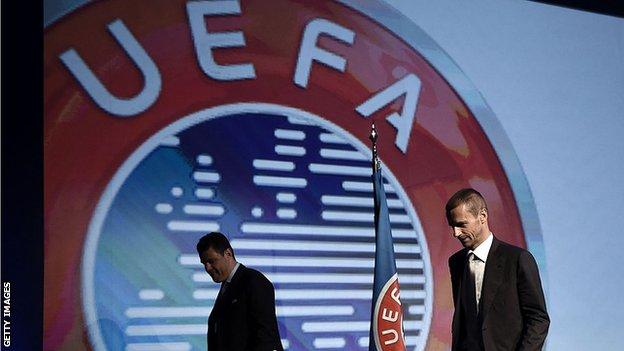
Uefa has introduced in new financial regulations which will limit clubs’ paying on wages, transfers and agents’ costs to 70% of their earnings.
Permitted losses above a three-yr interval have also risen from 30m euros (£24.98m) to 60m euros (£49.96m).
The new principles will arrive into drive in June and golf equipment will have a few many years to employ them.
Uefa claimed “breaches will consequence in pre-described financial penalties and sporting actions”.
It is considered new reinforced punishments, such as details deductions, demotion to lower-rating competitions and probable exclusion from European football wholly, will be released as part of the new polices.
Clubs are predicted to be authorized to commit 90% of their revenue in 2023-24, lessening to 80% in 2024-25 and 70% a yr later on.
The new “economic sustainability polices” have been set collectively by Uefa and the influential European Clubs Association (ECA) and “are the initial significant reform” of the fiscal honest play (FFP) policies released in 2010.
“Uefa’s very first monetary rules, released in 2010, served its primary function,” claimed Aleksander Ceferin, president of European football’s governing overall body.
“They helped pull European soccer finances back from the brink and revolutionised how European soccer clubs are operate.
“Even so, the evolution of the soccer field, alongside the unavoidable money outcomes of the pandemic, has revealed the want for wholesale reform and new economic sustainability restrictions.
“These [new] laws will assistance us safeguard the recreation and get ready it for any potential long run shock, though encouraging rational investments and developing a more sustainable foreseeable future for the recreation.”
In a assertion, Uefa extra: “Whilst the suitable deviation has greater from 30m euros about three many years to 60m over 3 several years, requirements to be certain the fair benefit of transactions, to make improvements to the clubs’ harmony sheet, and to decrease money owed have been appreciably strengthened.
“The most important innovation in the new polices will be the introduction of a squad price rule to convey better expense command in relation to participant wages and transfer prices.
“The regulation limits paying on wages, transfers, and agent costs to 70% of club profits.”
What are the recent FFP principles?
At present, clubs can shell out up to 5m euros far more than they generate for every 3-12 months evaluation period. Nonetheless, they can exceed this level to a limit of 30m euros, if it is fully protected by a direct contribution/payment from the club proprietor(s) or a connected social gathering. According to Uefa, the idea of this was to “avoid the construct-up of unsustainable credit card debt”.
Uefa has a vast-ranging record of opportunity punishments for clubs which split these guidelines, from a warning to loss of European titles. In 2020, Wolves were fined 200k euros and offered a 23-guy squad limit as a substitute of the usual 25 following breaching Uefa’s FFP guidelines.
Nevertheless, given the monetary effects of Covd-19, which has viewed European major-flight clubs drop £7bn, Uefa felt the policies needed to be improved.
There experienced been speculation all around the implementation of an real income cap, but this concept has now been abandoned.


